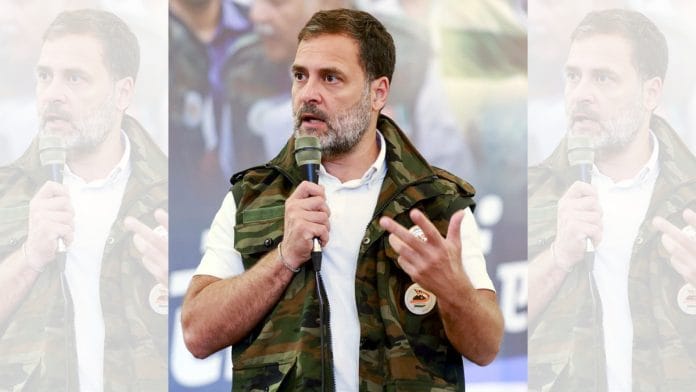New Delhi: How do you know China occupied 2,000 square kilometres of Indian territory? If you were a true Indian, you would not say all this,” said the Supreme court on Monday, expressing strong disapproval of Congress leader Rahul Gandhi’s remarks about the Indian Army in the context of the 2020 Galwan Valley clash with China. Gandhi had made the statements during his Bharat Jodo Yatra.
“If you are a true Indian, you would not say all these things,” a bench of justices Dipankar Datta and Augustine Masih told senior advocate Abhishek Manu Singhvi, who was arguing for Gandhi against the Allahabad High Court order which had declined him relief in a criminal defamation case pending in the special MP/MLA court in Lucknow. Gandhi had challenged the trial Court’s summons issued to him on a complaint alleging defamation.
“Whatever you have to say, why don’t you say it in the Parliament? Why do you have to say this in social media posts?” Justice Datta asked when Singhvi, at the outset, defended the statement.
“If he cannot say these things which are published in the Press, he cannot be a leader of Opposition,” the senior counsel argued. However, later, on noticing the bench’s discontentment, Singhvi conceded Gandhi could have worded the comments better.
Despite taking umbrage, the bench gave relief to Gandhi after Singhvi highlighted a technical deficiency in the summons order. The bench stayed for three weeks the proceedings in the criminal defamation case in the trial court.
This was after Singhvi pointed out that as per section 223 of the Bharatiya Nyaya Suraksha Samhita (BNSS), prior hearing of Gandhi was mandatory before the summons were issued to him. He said the provision makes it obligatory for the court to hear the accused before summoning him/her.
Section 223 of BNSS lays down the procedure to be followed in complaint cases filed directly before the court. Under this, it is compulsory for the magistrate to give the accused an opportunity to be heard before taking cognizance of an offence on a complaint.
Singhvi admitted that Gandhi did not raise this question of law before the HC and the challenge there focused on the complainant’s locus, since he was neither a “person aggrieved” nor “person defamed”. Singhvi asserted the complaint was an attempt to harass Gandhi only for raising questions, which was part of his duty as the Leader of Opposition.
The Allahabad High Court had on 29 May rejected Gandhi’s plea to quash the summoning order issued by the MP/MLA court in Lucknow. In its order, a bench of justice Subhash Vidyarthi had observed that freedom of speech and expression does not include the freedom to make statements which are defamatory to the Indian Army.
The complaint against Gandhi has been filed by former Border Roads Organisation (BRO) Director Uday Shankar Srivastava. It accuses Gandhi of making derogatory remarks and objectionable comments on the clash between the Indian and Chinese armies on 9 December 2022.
Srivastava said Gandhi had defamed the Indian Army by repetitively stating that Chinese army “is thrashing our solders” in Arunachal Pradesh, and that the “Indian Press will not ask any question in this regard”.
Observing a prima facie case was made out against Gandhi, since his statement “appeared to have resulted in demoralising the Indian Army and their family members”, the trial court had issued the summons against him.
On Monday, the SC remarked that in case of a conflict across the border, it was not unusual to have casualties on both sides.
The bench enquired from Singhvi about the basis of Gandhi’s statement. “Tell Dr Singhvi, how do you get to know that 2,000 square kilometres of Indian territory were occupied by the Chinese? Were you there? Do you have any credible material? Why do you make these statements without any… If you were a true Indian, you would not say all this,” quipped Justice Datta.
Singhvi explained that Gandhi’s intention was to raise concerns about the suppression of information. In response to this, the bench advised that Gandhi should raise it before a proper forum.
(Edited by Viny Mishra)
Also read: China is sitting inside our country because Make in India ‘failed’, says Rahul Gandhi in Lok Sabha







He said it because he is not a true Indian
Of course, a true Indian will never speak like that. Rahul Gandhi is Italian, just like his mother. Hence, he said this.